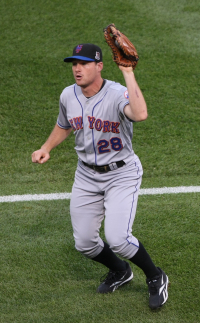The World Series will feature two expansion teams, the Kansas City Royals and the New York Mets, for the first time since Major League Baseball began expanding upon its original 16 teams 54 years ago. The clubs took different paths to reach this unexpected match-up, but we should have seen it coming. The pennant winners both bring the heat.
This match-up comes as a surprise to basically everyone; ESPN had “experts” pick divisional winners in the preseason. Of the 88 voters, only three picked the Royals to take the crown despite going to game seven of the World Series in 2014. Prognostics were even lower for the Mets with a sole vote to exceed the Nationals win total and make the playoffs for the first time since 2006. PECOTA, a well-trusted projection technique, had the Royals winning 73 and the Mets with 83. They actually finished with 95 and 90, respectively.
Despite the fact that the Royals were AL champions, most insiders were bearish on them. They had lost ace James Shields, as well as Billy Butler, Nori Aoki and Raul Ibanez. As replacements, Kansas City brought in Edinson Volquez, Ryan Madson, Alex Rios and Kendrys Morales, a fine group, but not enough to change a team entirely. Yet the quartet had surprisingly productive seasons. The White Sox and Indians both disappointed and the Tigers showed that their dynasty was over, allowing the Royals to easily take the divisional crown.
The Royals produced runs just as they had in 2014. The team finished near the bottom in home runs hit and had the lowest strikeout and walk rates. The fact that they do not strikeout is terrific, but their lack of power and free passes is alarming. Instead, they use speed to be aggressive on the base paths and make catches that most teams would surrender as hits. The Royals method of making contact and playing great defense has paid off dividends.
The Mets, on the other hand, were considered a rising team with another year left before they could be a serious contender. New York had the third least amount of runs scored in the first half near the trade deadline. Manager Terry Collins was putting out embarrassing lineups for a MLB team. A major turnaround occurred as newly acquired Yoenis Cespedes became one of the best hitters on the planet while the young pitching staff continued to throw gas. At no point in the season were they considered great, but the Mets managed to knock off the deep-pocketed Dodgers and slugging Cubs.
Daniel Murphy’s performance may be the grandest surprise of the season. The free-agent-to-be set a career high with 14 long balls but his power surge exploded in the postseason. Entering the World Series, Murphy homered in a postseason record six straight games and channeled his inner Carlos Beltran of the 2004 playoffs. In the sweep against the Cubs, he had nine hits in 17 at-bats. For the postseason, Murphy is hitting .429 with seven dingers and a pair of doubles.
While Murphy’s outburst is surprising, the role the Mets’ pitching has had in the playoff success is not. The rotation of Jacob deGrom, Matt Harvey, Steven Matz and Noah Syndergaard has been lights out even without postseason experience. Closer Jeurys Familia has allowed just two hits in 9.2 innings while nailing down all five save opportunities.
Speed will be a deciding factor in the World Series. Whether it is Lorenzo Cain scoring from first on a single representing the winning run, or the Mets’ rotation lighting up radar guns, the team that best takes advantage of its strength will come out on top.





